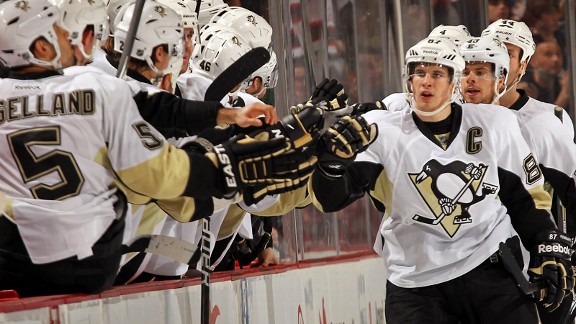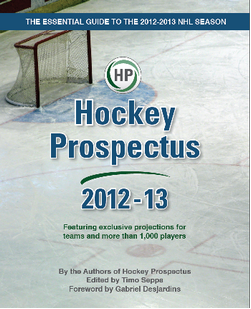 Bruce Bennett/Getty ImagesCan Sidney Crosby and the Penguins recapture the Stanley Cup?
Bruce Bennett/Getty ImagesCan Sidney Crosby and the Penguins recapture the Stanley Cup?
Who will raise the Stanley Cup in 2013? Will the 2009 champion Pittsburgh Penguins again hoist the trophy? Or will the Boston Bruins (2011 winners), Chicago Blackhawks (2010 champion) or Vancouver Canucks (2011 runner-up) take the title?
Those teams should be considered among this season's favorites according to VUKOTA, the projection system created by Tom Awad of Hockey Prospectus back in 2009. Named after Islanders tough guy Mick Vukota, VUKOTA is fundamentally a player projection system, and thus it projects individual statistics such as goals, assists, save percentage and games played -- summarized in another stat we callgoals versus threshold, or GVT. However, since team GVT is simply the sum of player GVTs, the sum of the VUKOTA GVT values for a team becomes our projection for the team's goal differential. On average, teams record one extra point in the standings for every three goals scored or prevented. Using this as a barometer, we're able to use that differential to project their finish in the standings. (Click here for a more detailed explanation of VUKOTA.)
VUKOTA gained credibility by correctly tabbing the up-and-coming Chicago Blackhawks as 2010 Western Conference champions. And as far as individual projections go, David Staples of the Edmonton Journal concluded that VUKOTA was the best for "predicting the point totals of Edmonton Oilers players" for the past two seasons.
The chart on the right outlines VUKOTA projections for the shortened 2013 NHL season, with its original 82-game projections and 48-game equivalents.
As demonstrated last season when the eighth-seeded Los Angeles Kings knocked off the sixth-seeded New Jersey Devils to capture the Stanley Cup, regular-season success, or lack thereof, doesn't necessarily predestine a team's fate in the postseason.
The playoffs are a crapshoot; even dominant teams shouldn't be considered to have more than a 25 percent chance of winning it all. What we can get a better handle on is how teams will do over the long haul of the regular season -- even when that "long haul" is a shorter haul of 48 games. So consider our projections more of a forecast regarding which team is likely to be the President's Trophy winner rather than the Stanley Cup champ.
Here's a look at top contenders, bubble teams and cellar-dwellers for the 2013 NHL season.
Top contenders
Pittsburgh Penguins -- Heading into the 2012 postseason, the Sidney Crosby and Evgeni Malkin-led Penguins were installed as Cup favorites by Vegas after averaging a torrid 4.5 goals per game over the final month of the season. It didn't work out so well; Pittsburgh suffered a first-round ouster to rival Philadelphia as Marc-Andre Fleury was outplayed by Ilya Bryzgalov in an unexpected goal-fest. But with the under-the-radar summer acquisition of unappreciated goalie Tomas Vokoun, the Penguins may have fixed their only significant weakness.
Boston Bruins -- For the first time in the past few seasons, the Bruins' biggest question mark is in net, with Conn Smythe and two-time Vezina Award winner Tim Thomas stepping away from hockey, at least for the time being. The 25-year-old Tuukka Rask put up a near-Vezina season in 45 games as a younger man in 2009-10, but no one knows if he can carry the load over a full -- albeit 48-game -- season. Plus, the Bruins don't have a veteran backup as a safety net.
Vancouver Canucks -- The Canucks had the misfortune of facing a red-hot Kings team that was much better than their No. 8 seed indicated. By the time top forward Daniel Sedinreturned to the lineup and they had settled on Cory Schneider in net, it was too late to recover. It's easy to forget the Canucks were back-to-back President's Trophy winners.
Chicago Blackhawks -- The Blackhawks remain a top contender, masked by some recent playoff misfortune. Losing to a dominant Canucks squad in overtime of Game 7 in 2011 and getting stonewalled by Mike Smith despite outplaying the Coyotes in 2012 are excusable series losses. Chicago's biggest unknown is the quality of the next wave of youngsters coming up to reload the squad with more talent; depending on how they fare, the Blackhawks could remain solid or vault back up to a top contender for the next few seasons.
Los Angeles Kings -- As dominant as the Kings were in the playoffs (16-4), you might question why we don't have them installed as favorites. Aside from wondering whether they can keep up the motivation throughout another regular season (just ask the 2011-12 Bruins, who faded in the second half), the Kings' biggest question is between the pipes. As fantastic as Jonathan Quick was in 2011-12, goaltending performances are notoriously fleeting. Before last season, the soon-to-be 27-year-old hadn't proved to be anything more than a slightly above-average netminder -- and now he's coming off of back surgery. Conversely, though, one of the reasons L.A. was better than perceived going into the 2012 playoffs was its awful puck luck throughout most of the campaign, which turned around after the coaching change to Darryl Sutter, the acquisition of Jeff Carter and simply better fortune on its unsustainably poor shooting percentages.
Bubble teams
Minnesota Wild -- Even with the big free-agent additions of Zach Parise and Ryan Suter, Minnesota has only risen from our 30th-ranked team from last preseason (and it played like it for the second half of 2011-12) to a fringe playoff contender this campaign. The Wild have talent coming through the pipeline, but it's likely a season or two early for Minnesota.
Carolina Hurricanes and Toronto Maple Leafs -- Other teams that may have improved enough to plan for additional dates in May include the Hurricanes -- bolstered by "possession monster" Jordan Staal and Alexander Semin -- and the Maple Leafs. If you think back to last season, Toronto was right in the thick of the hunt at 48 games before its late-season collapse sent it to the draft lottery.
Cellar-dwellers
Columbus Blue Jackets -- At the other end of the spectrum, it's no shock that we foresee the Blue Jackets as most likely to finish last. Though they have picked up some building blocks for the future, the departure of Rick Nash won't help their short-term prospects.
Florida Panthers -- How about projecting last season's third-seeded Panthers as 29th in the league? Though Florida arguably has the league's most talented farm system, VUKOTA is bearish on the Panthers' prospects in the short term. A fortunate 18-7 record in overtime and the shootout helped them overcome a negative goal differential (minus-24). Florida's luck with "loser points" was similar to that of Anaheim in 2010-11, and we saw how that worked out for the Ducks in 2011-12.
Phoenix Coyotes and New Jersey Devils -- We also peg Western Conference finalist Phoenix and Cup finalist New Jersey as likely to fall from the postseason ranks. Expected regression by last season's top goaltender by GVT, Mike Smith, explains the Coyotes' fall, while the Devils have to deal with the departure of captain and top two-way forward Parise. That said, coaches Dave Tippett and Peter DeBoer have shown their ability to lift squads of mediocre talent, so it's possible that one or both of these teams will confound VUKOTA.
Final note
In terms of the projections, clearly some teams will do better than 61 points (prorated from 104 over 82 games) and worse than 47 points (prorated from 81). Likewise, chances are also good that the best and worst teams won't be the Penguins and Jackets. Why? Because some teams will have an unfair share of good and bad fortune in terms of both injuries and action on the ice.
What you see in our above projections are the most likely outcomes for each team, which end up more bunched up than they will be in reality. But there's no telling which teams will be the recipients of what kind of fortune. That's why they play the games.

No comments:
Post a Comment